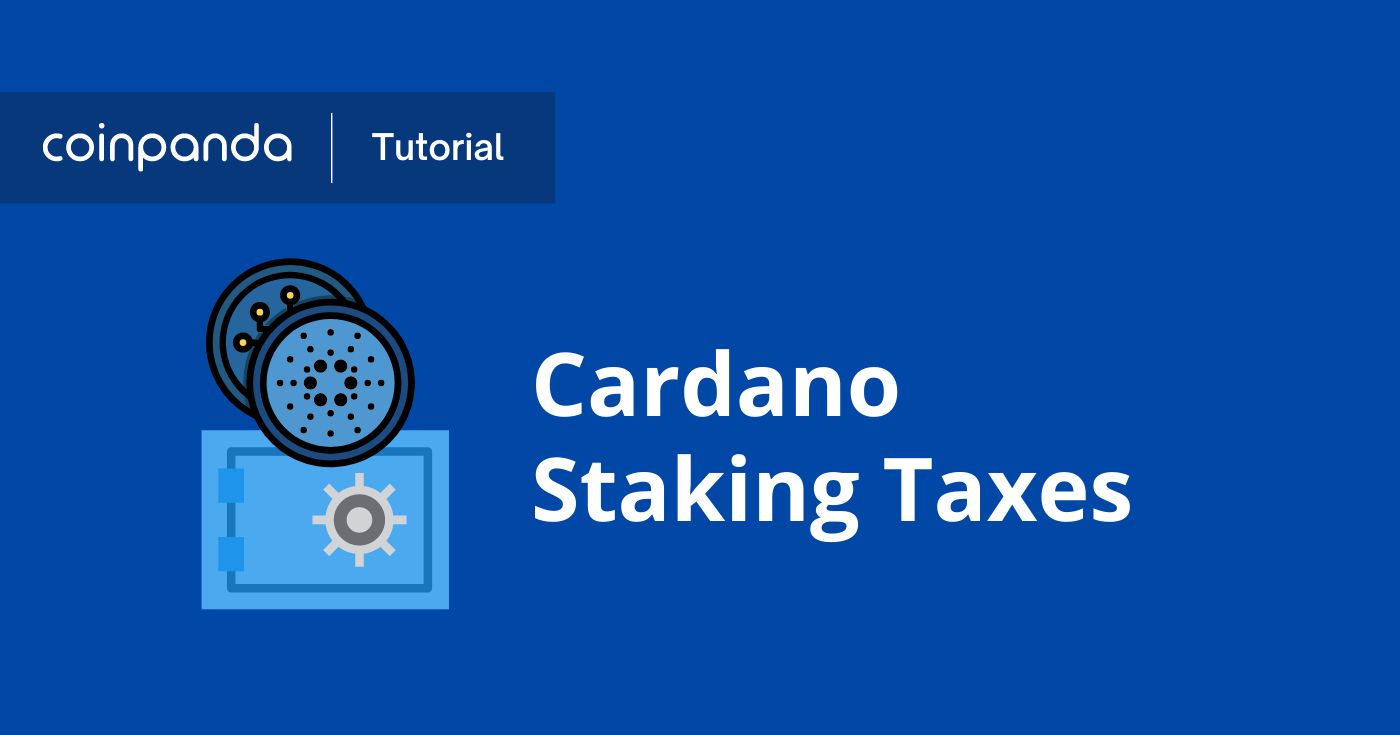Understanding the tax implications of Cardano staking rewards is crucial for anyone participating in this popular cryptocurrency endeavor, and the tax responsibilities that also come with it might initially seem confusing. From explaining how rewards are taxed to providing valuable tips on tax minimization, we’ve got you covered in this guide.
How Cardano rewards are taxed
Cardano staking rewards are typically taxed as income at their fair market value in local currency at the time of receipt and may also be subject to capital gains tax if sold at a profit at a later date, with the specific tax rates dependent on individual income and local tax laws.
Income tax
The tax implications associated with staking Cardano rely on the assumption that any rewards earned through staking activities are typically considered income. In many jurisdictions, including the United States, tax authorities view cryptocurrency staking rewards as taxable income at the time when the rewards are credited to the wallet. This means that when you earn ADA (Cardano’s native cryptocurrency) through staking, the value of those rewards in your local fiat currency (such as USD, EUR, etc.) on the day received must be reported as income on your tax return the following year. The exact amount of tax you owe will depend on your total income level and the specific tax rates in your region.
Capital gains tax
However, it’s also essential to consider capital gains tax when staking Cardano. Let’s say you decide to sell your staked ADA rewards later. If the value of the coins has increased since you initially received them, you’ll be liable for capital gains tax on the difference. The applicable capital gains tax rate varies from country to country and will, in some jurisdictions, depend on factors like your total capital gains or the length of time you held the cryptocurrency before selling. If you’re in the U.S., for instance, long-term capital gains rates may apply if you held the ADA for more than a year before selling, which can potentially offer tax advantages compared to selling within a shorter time frame.
How to calculate Cardano staking taxes
There are essentially two ways to calculate your staking income from Cardano. You can do it manually (the hard way) or use cryptocurrency tax software to automate the entire process. We will look at both methods in this section.
Calculate manually
Calculating income from Cardano staking manually involves three steps:
- Export a complete history of all staking rewards transactions
- Calculate the Fair Market Value of each transaction
- Summarize the values to find the total income
To complete the first step, we recommend using Cardano PoolTool. This tool lets you view and export all staking-related transactions of any public Cardano address.
First, you need to find your wallet address. Depending on which wallet you are using, you will most likely find your address after logging in to the wallet. In most wallets, the Cardano address used for staking will have a format like “stake…”.
The image below shows how to view all staking-related transactions using PoolTool. Click first “REWARDS DATA FOR TAXES”, then enter your address, and then lastly, click the green arrow icon in the search result below.
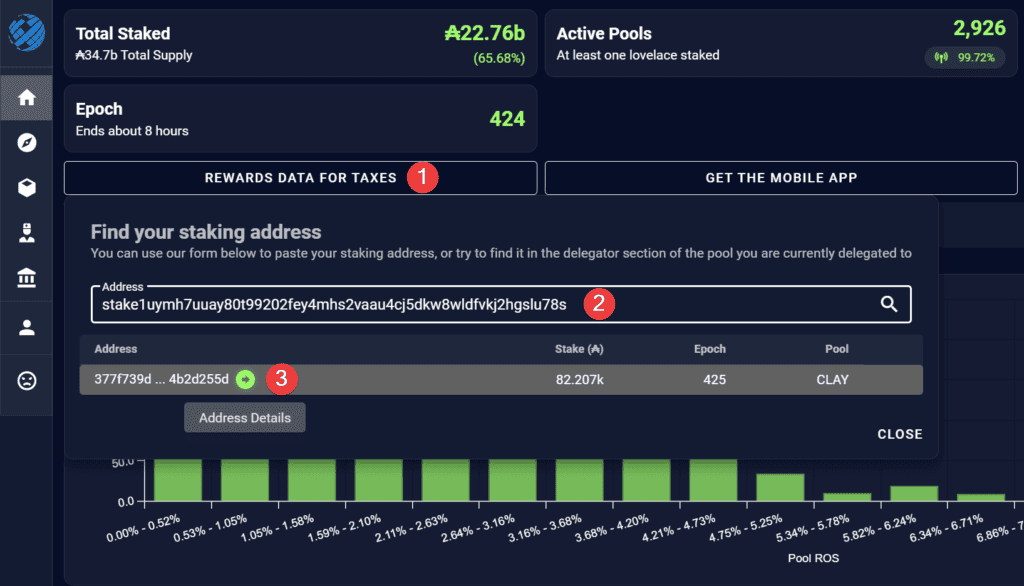
To export the transaction history, start by selecting Generic(CSV) in the format dropdown, and select the fiat currency of your choice (typically the fiat currency in your home country). We recommend keeping the date range empty and selecting All in the epoch dropdown to ensure all transactions are exported.
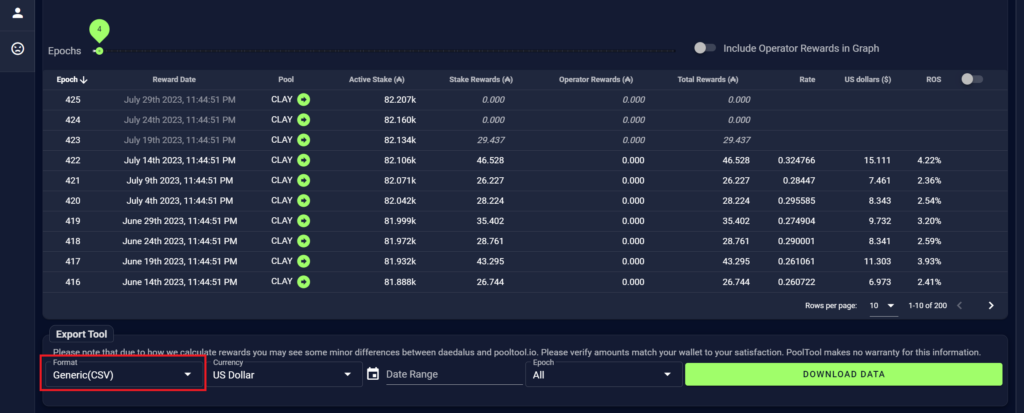
After exporting the file, you can open it in a spreadsheet editor like Google Sheets. The last column will include the value of all transactions in the fiat currency selected, so now you need to summarize the values for all days in the tax year to find the total income amount you should report in the tax return.
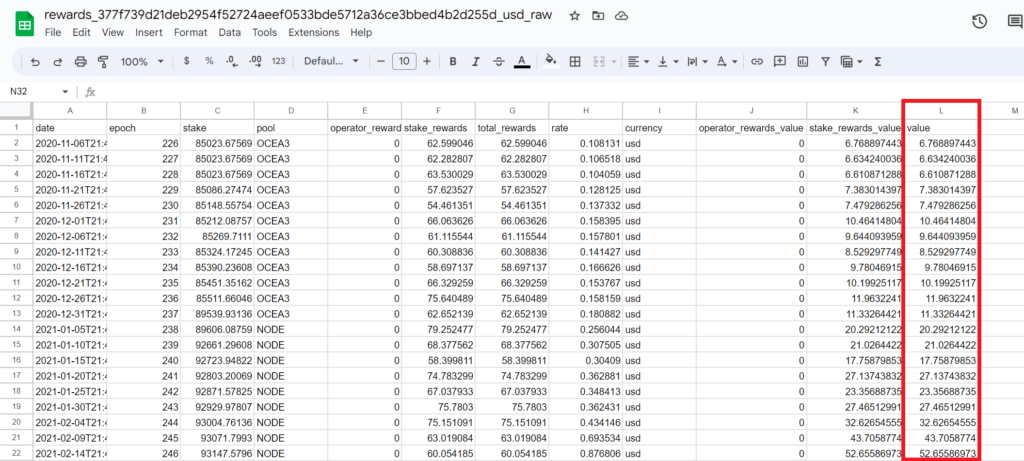
Using crypto tax software
For most users, using cryptocurrency tax software is most likely the best option. Coinpanda can automatically track and import all transactions, including staking rewards, from Cardano and 300+ other blockchains supported.
You can sign up for a free account first, add your Cardano address, and Coinpanda will automatically import all the transactions and do all required calculations in just a few minutes.
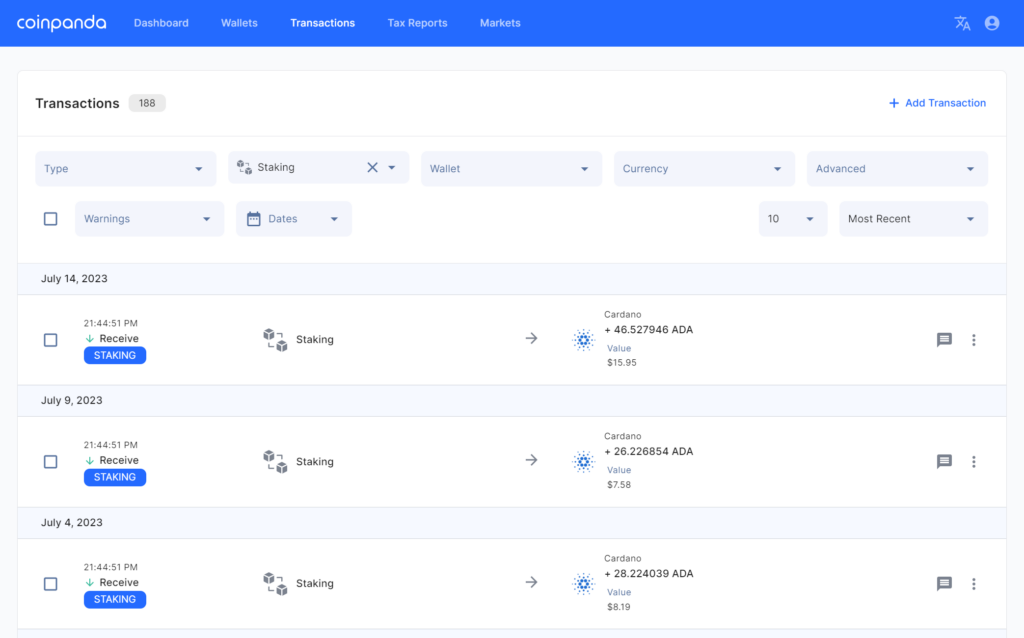
After you have connected all your wallets and exchange accounts, you can download all the required tax reports and documents that you need for filing your taxes. If you are above the free limit, you can upgrade to a paid plan starting from $49.
The image below shows the Income summary section from the Complete Tax Report, where the total taxable income amount from all transactions is shown. Typically, this is the income you should report in your tax return. The tax report also includes a table of all transactions considered taxable income, which can be sent to your tax accountant or used in case of an audit.

Tips for minimizing Cardano staking taxes
One key strategy to potentially reduce your Cardano staking taxes involves mindful timing of when you choose to sell your staked ADA rewards. In some jurisdictions, like the United States, the tax rate for long-term capital gains (for assets held for over a year) is lower than for short-term capital gains. By holding onto your ADA rewards for more than a year before selling, you might qualify for this lower tax rate. In some countries, such as Germany, long-term capital gains are even completely tax-free for all taxpayers independent of their total income or capital gains amount.
Another tip to consider is harvesting your tax losses. This involves selling your cryptocurrencies that have decreased in value since you acquired them. Any unrealized losses from staking rewards may offset your capital gains from other transactions; thus, you can reduce your tax bill by selling the coins you own. However, beware of wash-sale rules or similar that apply in some countries, such as Canada and the UK, which prohibits selling at a loss and rebuying the same crypto asset within a specific timeframe for the purpose of claiming a loss.
Lastly, it’s essential to keep precise records of all your staking transactions. While it might not directly minimize your taxes, good record-keeping can help ensure you accurately report your income and do not pay more taxes than required. Various cryptocurrency tax software can assist with this task by integrating with your wallet or exchange and tracking your transactions automatically.
Remember, any approach to minimizing tax liability should comply with and follow the regulations in your country. It’s always a good idea to consult with a tax professional if you need more tailored advice for your situation.
